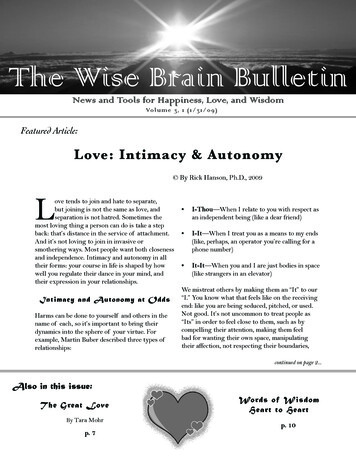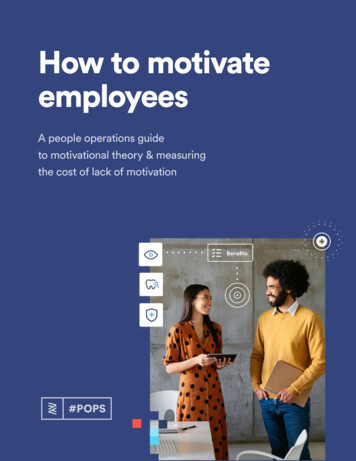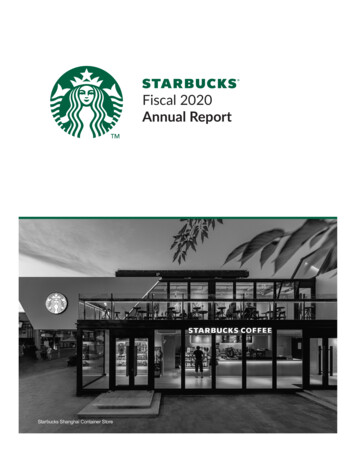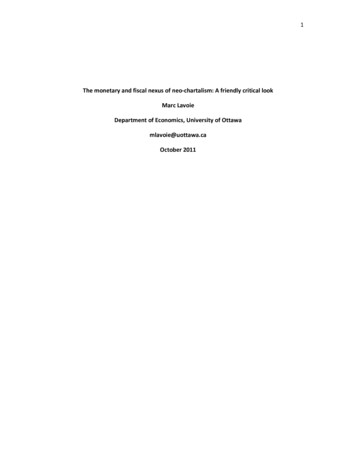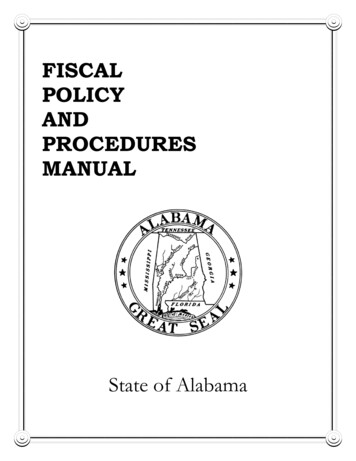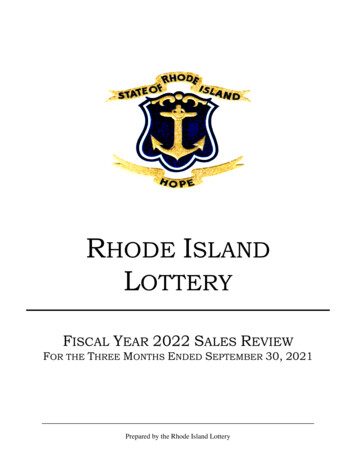
Transcription
chokka blogthinking allowed: musings on business, the economy and scottish politics @kevverageVideo BarSaturday, 18 April 2015Loading.Full Fiscal Autonomy for DummiesPraise for ChokkablogFull Fiscal Autonomy (FFA) means Scotland keeping everything we raise from taxesand using that money for our own spending (including paying the UK governmentfor defence and foreign affairs and certain shared administrative services).If we spend more than we raise we run a deficit. That is not in itself necessarily aproblem; FFA doesn't mean we can't run a deficit.Follow @kevverageSearch This BlogUnder FFA we would still be sharing a currency and a national debt with the rest ofthe UK, so to be be paying our way we would simply need to be running a deficit atSearcha similar rate 1 to the rest of the UK.Blog ArchiveIf Scotland's deficit rate 1 was higher there would be a funding gap (i.e. our fairshare 1 of UK debt would not be enough to balance the books). It's expected thiswould be handled by Scotland having its own limited borrowing powers. A limitwould need to be agreed because we'd be sharing a currency meaning Scotland'sborrowing could affect the UK's international credit rating and cost of debt.Of course if Scotland's deficit rate was lower than the UK's we would be running arelative surplus. Under FFA any such funds would be kept for Scotland to pay forfuture tax cuts and/or public spending increases or - whisper it - to build a wealthfund.In summary: for Scotland to be truly fully fiscally autonomous we would ceaseexceptional transfers to or from the rest of the UK.Now let's remind ourselves of some of the rhetoric used by the Yes campaign andthink what it would means in the context of FFA;If the fact that Scots have "paid more tax per head of population everyyear for the past 34 years." means we're hard done by within the UKthen FFA will fix that because we'll get to keep it all.If we really do "send more to Westminster than we get back" then FFAwould put a stop to that immediately because we wouldn't be sendingany of our taxes to Westminster.If the statement "Independence would have made Scotland 8.3bn betteroff over the last 5 years" has any meaning then FFA would allow us tokeep our hands on that excess wealth in the futureIf "Scotland's GDP per head is 2,300 higher than UK as whole"meaning "Scotland is the 14th richest country in the world" translatesinto practical economic advantage then FFA will allow the people ofScotland to enjoy those riches without them be leached away byWestminster 2016 (12) 2015 (45) December (5) November (4) October (6) August (2) July (2) June (2) May (7) April (4)Full Fiscal Autonomy in 700WordsOil Price and Scottish TaxGenerationFull Fiscal Autonomy forDummiesExplaining the 7.6bn "FFABlack-Hole" March (6) February (5) January (2) 2014 (40) 2013 (3) 2011 (15) 2010 (8)If "Oil is just a bonus" then the oil price decline shouldn't really matterPopular PostsIf these economic claims made by the SNP during the Independence ReferendumFull Fiscal Autonomy for Dummies
can be taken at face-value then FFA would be a highly attractive proposition forScotland.Wee Blue Book of Errors Part I:EconomyWee Blue Book of Errors Part II:PensionsThe NumbersWe can see what FFA would have meant historically for Scotland’s finances bysimply looking at the Scottish Government's own GERS report. We need to beabsolutely clear about this: these are not Westminster's figures - the ScottishGovernment's Chief Statistician takes responsibility for them.If you don't think the GERS figures are meaningful then please read footnote 2. Ifyou still doubt them please read this How Scotland's Economy Contributes to theUK. If you still doubt them after that please stop reading this blog.The Fabulously Absolute SNPLet's Talk About GrowthCircles Within CirclesThe Great EscapeStop Getting GERS wrongFFA in 700 wordsSummary: Scotland in the UKEconomyScotland's EconomyYes or No: Makes no DifferencePublic SpendingIts Not About The NumbersThe GERS figures shows how Scotland's public spending is consistently higher perSimplify, Exaggerate & Carry OnRegardlessperson than the rest of the UK3 . Over the last 15 years (adjusted for inflation) theaverage higher spend is 1,4564 per person or 7.8bn per year.Why Do I CareBBC Bias and the IndependenceReferendumCurrency Union & EconomicAsymmetryWe Should Decide Who Governs Us 8.3bn Better Off?The Wee Blue Book (of Lies)Wings Over Scotland: An ApologyBusiness for Scotland: Who AreThey?Independence & Economy "Facts": AResponseDunleavy & Cost of IndependenceMy Bona FidesMy Twitter FeedTweets by @kevverageGoogle If we break this spend difference down by category it shows we spend more percapita in every major cost area 5,6My StuffMy Linked in net.co.ukThese higher per capita spend levels should not be interpreted as evidence of somewild profligacy by the Scottish Government or excessive generosity on the part of the
UK towards Scotland. Our population density is 80% lower than the rest of the UKand we have extensive island communities to serve - this obviously makes it moreexpensive to provide the same level of public services in areas such as education,health, and transport. There are of course other reasons for higher per capita costsin Scotland related to our demographics and health needs - but let's not getdistracted by that topic here 7 .The point is that today - based on the principle that where possible the same publicservice levels should be provided nationally - these higher costs are spread acrossthe whole UK population. Of course under FFA (as with Independence) the burdenof our higher "costs-to-serve" would have to be borne exclusively by Scottish taxpayers.As an aside: you might spot in the graph above that these figures expose the factthat under the SNP government education spending has been cut in relativeterms. Widespread access to good quality education is surely crucial both toaddress "social justice" concerns and to ensure we have well-educated talententering our working population to help grow the economy. This prioritisation ofeducation spending is something we'll surely here more of come the Holyroodelections in 2016.Tax Revenues excluding OilThe GERS figures show that - before oil is included - we generate slightly less taxper person then the UK average. This is a remarkably consistent trend; over the last15 years (adjusted for inflation) the average difference is 250 per person or 1.3bnper year
As with the costs it's interesting to break this figure down into its component parts8What's striking is the extent to which Scotland's income and wealth tax generationlags the rest of the UK. Given that the same tax rates apply UK wide this is ofcourse primarily a function of average employment and pay levels. Since 2006 theunemployment rate in Scotland has generally been near or below the UK rate (seeUK regional employment stats over time) so we can infer that the difference is dueto lower average wage levels. There does at least appear to be an encouraging trendin this respect.As a slightly depressing aside it's worth noting that we generate just over 100 percapita (or 0.5bn) more than the rest of the UK through "sin taxes" on alcohol,betting and tobacco.Relative Deficit Excluding OilDuring the referendum the SNP told us "Oil revenues will be a "bonus" but not thebasis of the economy in an independent Scotland" [ Alex Salmond, July 2013].So before including the "bonus" of oil let's look at the last 15 years actual differencein deficit per capita between Scotland and the rest of the UK;
Of course this will come as no surprise if you're following the logic here; we spendabout 1,450 more and raise about 250 less per person so we'd expect an averagedeficit difference of about 1,700 per person and that's exactly what we see.Gross that up by Scotland's 5.3m population and you get to an underlying (beforeoil) deficit gap of 9.1bn. This is not just a snapshot - this has been true (give ortake 9 ) for every one of the 15 years for which data is available.At this stage somebody normally argues that this observation is evidence that the UKhas failed Scotland - it must be Westminster's fault that our underlying deficit is somuch worse. Let's just think about that for a moment. Of that 9.1bn gap only 1.3bn is due to lower tax generation (i.e. less successful economic activity); thebalance of 7.8bn is due to higher public expenditure. It seems a little harsh to cryfoul against the rest of the UK for making us suffer higher levels of public funding.The Impact of OilSo now let's move on to the "bonus" that is oil. The following graph shows thehigher spend per capita (the red line) and the lower ex-oil revenue per capita (blueline) that we've just been looking at. The new black line is the total revenue percapita difference if we include Scotland's full geographic share 10 of North Sea oil
Clearly when the black line is above the red line Scotland's deficit per capita is lessthan the rest of the UK's. That's happened three times in the last 15 years as thegraph below perhaps more clearly shows (we're just plotting the difference betweenthe red and black lines).Surely by now its clear. Oil is not a bonus; in fact it's all about the oil.Three times in the last 15 years the oil tide has risen high enough to submerge theunderlying 1,700 per capita deficit difference and give Scotland a lower deficit thanthe rest of the UK. When the oil tide flows out we can see more of that underlying 1,700/person deficit difference, we see more of the 9.1bn.So let's take a closer look at the oil figures.For Scotland to cover the underlying 9.1bn deficit gap we' need total North Sea oilrevenues of 10.1bn (because c.90% of North Sea oil revenues are attributable toScotland11 ).Let's look at that in the context of historical actual figures (grey bars) and the OBR'slatest forecasts (sludgy bars). The solid green line is the approximate actual NorthSea revenues we would have needed in each year to off-set our deficit difference tothe rest of the UK; the dotted green line is the 15 year average requirement.Roughly speaking: the gap between the bars and the green line is the size of the
deficit gap that Scotland would have faced (or would be expected to face) underFFA.This is where the IFS 7.6bn "black-hole" figure comes from; they're simplyrecognising that when Scotland's share of North Sea oil revenues slumps as low as 600m (as the OBR forecast for 2015-16) then more of the underlying deficit gapwill be exposed. Note that the OBR forecast a further slight deterioration of NorthSea oil revenues in 2016-17; the black-hole is not expected to be getting any smaller.Note also that 7.6bn is not the size of Scotland's forecast deficit as some seem tothink - the forecast deficit is 14.2bn or 8.6% of GDP.The sharper of you will have noticed that our figure of 9.1bn - 0.6bn from oil 8.5bn compared to the IFS headline "black-hole" figure of 7.6bn. There are goodmethodological reasons12 for the difference but frankly these are not worth arguingabout in the big scheme of things.Let's stick with the easy round number of a forecast 8bn deficit gap - this is theFFA "Black-hole".Addendum: You might be thinking that a recovery in the oil price changeseverything. It doesn't as I explain in detail here Oil Price and Scottish TaxGeneration. The problem - simply - is that it's profit that gets taxed and theprofitability of North Sea oil production is in long-term decline because ofincreasing production costs. The tax that an oil price of 100 generated 2 yearsago is a lot more than the tax a 100 price would generate in 2 years' time
So What?Clearly for the SNP the undeniable reality of the FFA figures is a huge problem,particularly given the boldness of their referendum rhetoric. Remember:"We paid more tax per head of population every year for the past 34years.""We send more to Westminster than we get back""Independence would have made Scotland 8.3bn better off over the last5 years""Scotland is the 14th richest country in the world""Oil is just a bonus"It must be pretty difficult for Yes voters who were won over by these oft repeatedsound-bites to understand how we can now see that a Fully Fiscally AutonomousScotland would be c. 8bn a year worse off. You'll forgive me if I suggest that thosewho read Chokkablog will not find that so difficult to grasp; well done you.So what of the Independence case now? Well there appear to be two approachesbeing taken to deal with the inconvenient economic truth;1. The "No Detriment" DefenceThis is the line taken by Alex salmond in what Kenny Farquharson (Deputy Editor ofthe Scotsman and Scotland on Sunday) described as "perhaps the most ludicrouspolitical intervention of his career"Just catching up with Salmond's piece in The National. Perhaps themost ludicrous political intervention of his career.— Kenny Farquharson (@KennyFarq) April 13, 2015Salmond's argument goes something like this (forgive me but it's hard to paraphraselogical nonsense);The Smith Commission decided against full fiscal autonomy but insteadrecommended a far more nuanced solution that allowed a number ofprinciples to be maintained, one of which was "no detriment". I want tothrow away everything the Smith Commission recommended except "nodetriment" and use that to suggest we couldn't be worse off under FFAbecause it would be a betrayal of the Smith Commission commitmentIs it necessary to spell out the insanity of this position? The Smith Commission hada number of principles (Frances Coppola covers the detail in her excellent Pieriapiece on this topic) - you can't just cherry-pick one and throw away the rest. The"no detriment" principle is clearly intended to cover the fact that the transfer of anyspecific tax to Scotland would be off-set on day one by a commensurate reduction inthe Barnett Formula so that no immediate gain or loss resulted for either party.Smith did not recommend devolving oil revenues to Scotland presumably at least inpart because it is so volatile - the day chosen as "day one" for the transfer wouldmake a huge difference to the long-run implications for both parties.More fundamentally; arguing that Barnett needs to be maintained to avoid Scotlandlosing out financially as a result of FFA gives a lie to all of Salmon's pre-Indyrefrhetoric about Scotland being better off, being "the 14th richest country in theworld". Remember: those statements were not made about what Scotland couldbecome, they were assertions about where Scotland already is.2. The "Kick It Into The Long Grass" DefenceThis seems to be the approach favoured by Sturgeon. The argument goes somethinglike thisLook it won't happen soon anyway so don't bother looking at thenumbers now because they'll all have changed before we could negotiatethis. Ooh Look over there - see that foodbank? Torys are nasty bastards
aren't they? Labour are just as bad but if you vote for us we'll makethem better etc.Despite her best attempts to distract from the economic facts it's clear that the onlyways the figures will get better for an FFA Scotland areIf oil recovers dramatically. Which it might. But surely now everyScottish voter "gets" how volatile oil revenue is, understands that adecision to leap for fiscal freedom in a good oil year is likely to bite us inthe arse come the next oil slumpIf we dramatically reduce public spending in Scotland beyond the levelsof UK wide cuts (remember: its the deficit difference to the rest of theUK that counts here). Frankly that clearly won't happen unless it's forcedon us through Barnett cuts.If we increase tax rates dramatically such that we raise an additional 8bn or so from onshore taxes. The current onshore tax take inScotland is 50bn so that would be a 16% increase.If we manage to buck the trend of the last 15 years (at least) and startgenerating economic growth over and above that of the rest of the UK sothat our tax take increases without having to increase tax rates. The sumis the same as the one above; this would require 16% growth over andabove that achieved by the rest of the UK to close the FFA gapEven assuming a following wind and some combination of all of the abovehappening it's hard to see how things could particularly rosy for the Independencecase even by 2020.The possible exception I suppose is the possibility that the Barnett Formula couldend up being scrapped. Given her antagonistic approach to the Tories maybe that'swhat Sturgeon is secretly hoping for? Sure Scots would suffer directly as a result but if all you care about is achieving Independence, I guess you consider that a priceworth paying.Implications for IndependenceOf course all of the above is about FFA, so some would argue that it merely provesthat a compromise won't work and only full Independence can give the Scots whatthey want. Fair enough. All I've ever argued is that voters should be aware of theeconomic realities of what they're voting for and not be misled by the Yescampaign's rhetoric.The possible upside differences between FFA and Independence are reasonably easyto describe in summary;We'd get control of the defence expenditure that would remain devolvedto Westminster under FFA. Given the SNP's commitment to NATO andtheir target of spending 2% of GDP on defence this is unlikely to be asignificant cost saving: the GERS figure allocated for defence is 3.0bnor almost exactly 2% of GDP already13Similarly "International Services", but these are only 0.8bn andScotland would need to create its own international diplomatic andtrade networksWe'd no longer have to pay our share of UK wide administrative costs although these would likely be more than offset by the requirement tocreate our own administrative infrastructures14.If oil booms again as it did in the 1980's we'd get to keep the surplusriches for ourselvesWe'd get to pursue our own economic policies and not be forced tofollow the Westminster led austerity plans.Unless you're in favour of impotently waiting for the global oil market to recoverand hoping our oil reserves have long-term economic viability . the last of these is
the big question.I've yet to hear a compelling argument as to why an independent Scotland wouldachieve superior economic growth compared to being in the UK. If Westminsterparties believed relaxing spending cuts would be self-funding through improvedeconomic growth they'd be all over it - but they could of course be completely wrongand it may be that simply "not pursuing austerity" could make the difference.I don't mean to understate the alternative choices that we would have underindependence. One of the major frustrations of the indyref campaign was that somuch bollocks was talked about what our economic starting position really was thatwe never managed to have a substantive debate about what we might actually dowith the power that independence would give us.Remember that what we've shown here is that our underlying (excluding oil)economic under-performance versus the rest of the UK is mainly down to higherspending not lower revenue generation - it's predominantly a structural cost-sideissue which is not going to be easily overcome.Of course it goes without saying that there are additional downsides ofindependence that we don't need to revisit in full here. Suffice to say that currency,hindrance to UK trading, risk of job losses as companies serving the wider UKmarket head south to avoid exposure to export risk, EU membership conditions etc.are all major uncertainties introduced by independence that would appear to offerus more downside than upside.But let's run some simple numbers to think about what growing out of the deficitgap would actually require. We need to grow our tax revenue base by 16% over andabove the UK's growth to off-set the underlying deficit gap.The Independence White Paper itself provided an illustration of what might be arealistic superior growth rate to assume as the "bonus of being independent". I coverthe detail in a separate blog post ( Let's Talk About Growth), but the summary isthis;The Scottish Government's own attempt at scaling the economicgrowth benefits that "the bonus of being independent" might bring acumulative benefit of 3.8% over 30 years. We're looking for 16.0% togrow our way out of the deficit gap. As one of my erstwhile Americancolleagues used to say: you do the math.But let's be incredibly optimistic and say we were able to consistently grow 1% fasterthan the rest of the UK - in that case it would take us 15 years (compound growth)to get there.What would the average deficit gap be over that period - how much would it cost usto get there?Well given the strategy seems to involve spending more to make it happen (avoidingausterity cuts) the starting deficit gap would in fact be more than 8bn and - if we'dcontinue to spend more - it would take us more than 15 years to close the gap. Butlet's be highly optimistic and assume the average deficit gap would be 4bn over a15 year period. 15 x 4bn 60bn. Let's assume we fund that with debt - that'sover 12,000 of debt for every man, woman and child in Scotland.Now there are many who would still argue that independence is a worthwhile causeeven if it incredibly optimistically would cost us 12k per head. If they are willing torecognise the reality of the economic challenges we face and still argue forIndependence despite them, then I think we will have some very interesting debatesahead of us.
***************************Notes1. I've intentionally referred to "deficit rate" and "fair share" of borrowing to avoid getting bogged down in definitions thatmake little material difference. Basically these can be defined as being on a per head basis or percent of GDP basis. There is aninconsistency in most figures used at the moment because debt costs tend to be allocated on a per capita basis but deficitscompared on a % GDP basis. To make it easier for readers to relate figures to those widely quoted I'm going to follow thisinconsistent method. If we defined deficit rate on a per capita basis instead of % GDP it would make the case look slightlyworse for Scotland.2. Although you won't hear the accuracy of GERS figures questioned by serious politicians, some disreputable commentatorshave been responsible for spreading ridiculous misconceptions about them. The likes of Business for Scotland and Wings OverScotland have made startlingly misinformed statements about VAT and Alcohol Duty not being fully included in Scotland'snumbers. If they were right it would be a terrifying indictment of the Scottish Government's incompetence. They are wrong ofcourse: references to VAT being "paid at companies' headquarters" and Scotland not getting attributed "Alcohol Duty at pointof export" demonstrate a fundamental misunderstanding of how these taxes work and how they are attributed in GERS. Theseare consumption taxes and GERS estimates Scotland's share of these based on consumption data. There is no such thing as"Export Duty" on whisky.3. I compare Scotland to "rest of UK" (rUK) because otherwise we are comparing to a UK figure which includes us. I don'tunderstand why so few others do this - maybe because it's a little more analytical work.4. This figure is commonly quoted as 1,200. That figure is the non-inflation adjusted average from 07-08 to 11-12 (the periodavailable when the White Paper was produced) based on comparing Scotland to total UK rather than "rest of UK". I f weupdate to the most recent available 5 years GERS (09-10 - 13-14) the figure would be 1,245; adjust to be vs rUK instead of vsUK and it becomes 1,360; adjust for inflation and it becomes 1,415; take a 15 year average it becomes 1,465. I'd say 1,400is a good figure to use.5. Note that defence, foreign affairs and debt interest costs are not included on this graph because in GERS figures they areallocated on a simple per capita basis so the per capita difference is of course zero. This is consistent with the principles ofFFA.6. The "Accounting Adjustment/Other" line is worth explaining. It's primarily the difference between capital expenditure anddepreciation (and of course we are looking at the relative difference in this difference). In layman's terms it means Scotland is(very slightly and only in the latest year) at a point where it's rate of investment in capital programmes (compared to itshistorical average) is lower than rUK's.7 A technical point is worth highlighting as mentioned in GERS - "water and sewerage services are a public sectorresponsibility in Scotland, and are therefore included in Scottish public expenditure, whilst in England they are operated bythe private sector". This is of course balanced on the "tax generated" side by the operating surplus that Scottish Watercontributes to our revenues8. The Gross Operating Surplus (GOS) is mainly due to publicly owned Scottish Water; to some extent this surplus will offsetassociated higher spending compared to the UK where this utility is privatised9. Th e actual range over the 15 year period is 1,405 to 2,00310. Geographic share means we get to keep our oil - I'm stunned how often I still have to explain this11. The percentage of North Sea Oil revenues attributable to Scotland varies because there are North Sea oil fields that lie in"rest of UK" waters and it depends on their relative production output levels. Using the Scottish Government's preferredgeographic share methodology the average Scottish share of North Sea oil over the last 15 years has been about 90%
12. I've recreated the 7.6bn using the IFS assumptions here ( Explaining the 7.6bn "black-hole") and there are two factorsthat explain the difference. Firstly the figures above assume that the equivalent deficit rate we'd be required to achieve wouldbe defined on a per capita basis. Given this is how debt costs are currently allocated in GERS I think that is a betterassumption than the IFS's which requires the deficit to match as a percentage of GDP basis. Secondly the IFS analysiscompares Scotland to UK total (where UK obviously includes Scotland). I have stripped Scotland out of the UK figures tocompare Scotland and rUK which again I think is a better analysis13. Defence spending allocated to in GERS is 3.0bn in 2013-14 which is exactly 2.0% of GDP14. The House of Lords costs 87m to run - Scotland's share of that cost is therefore 10mPosted by Kevin Hague at 03:04Labels: 7.gbn, 8bn, deficit, ffa for dummmies, independence, indyref56 comments:Jim Coleman said.A careful analysis of the costs to Scotland of FFA. It's a pity that the nationalistswill not bother to read it. Wild assertions work better for them.18 April 2015 at 03:28Terry Summers said.Kevin,An excellent piece of work. Incisive analysis accessibly presented,Sturgeon/Swinney/Hosie should be able to follow this and see that the jig is upfor FFA. Salmond seems to have emigrated to LaLa land so will ignore this.I wonder if you could bend your mind to the last crutch the SNP seem to
have,cost savings on Trident.I have been forced to shout at the television and radio every time anyonementions the figure of 100Bn without a challenge to its authenticity ever sinceI fund out tat it was an estimate made by CND.An annualised figure based on the UK government estimates of constructioncosts and operating costs for the Trident replacement and how much of this costwould fall onto Scotland vs the income to Scotland from hosting Trident, I guess,would take away the economic argument and with the last economic crutch ofthe SNP campaign.I know you don't do requests, but could you think about it.CheerTerry18 April 2015 at 04:41Anonymous said.Incisive, well researched and as ever takes a flame thrower to the economiclunacy spouted by the yes side.The fact that this mob of charlatans are riding as high in the polls as they are is adepressing indictment on the country.18 April 2015 at 05:28Dave Cohen said.Thanks for that, very informative. I realise this is a huge 'what if', but wouldscrapping Trident bring a one-off financial bonus to Scotland?18 April 2015 at 05:35Dave Cohen said.Very clear and informative. Hugely hypothetical question I realise - but wouldthe scrapping of Trident bring a one-off bonus to Scottish finance underindependence?18 April 2015 at 05:37Kevin Hague said.Thanks TerryThe key point about Trident is that scrapping it is not a cost saving assuming theSNP remain committed to the 2% of GDP defence spend NATO target.Either way the number aren't as big as they make out (even if you divide themby the lifetime and then by 10 to work out Scotland's share) as this GuardianArticle explains18 April 2015 at 06:48Ron Sturrock said.First off, the 2 main parties say they will not back FFA.However, this does not mean we should disregard the SNP position for this foolsfolly.An area which requires some consideration:If FFA were to be established, imo, earliest would be April 17, at this point theUK debt would be apportioned though still covered by the LOLR facility of theBoE.
Even though rUK debt may fall by economic measures the assigned debt level forScotland would probably remain the same.Any debt incurred by an SG after establishment of FFA would be to Scotland'sown account and under strict borrowing levels, 3% GDP?The other aspect to be considered is the debt/GDP ratio.For 17/18 PSND is f'cast circa 1.6trillion so Scotland on pop share 133bn.(76% GDP)For 17/18 f'cast GDP of 175bn, borrow @3% 5bn.Of course the aim will to ensure debt as a %age of GDP is reducing.What really is unsatisfactory (so far) is the reluctance of SG to produce theirown figures for FFA.Still not to worry, BfS say that if oil returns to 70/80 deficits will be solved.18 April 2015 at 06:56Anonymous said.I'm a Celt watching from the sidelines so please forgive me if I've missedsomething.My reading of the situation is
chokka blog Saturday, 18 April 2015 Full Fiscal Autonomy for Dummies Full Fiscal Autonomy (FFA) means Scotland keeping everything we raise from taxes and using that money for our own spending (including paying the UK government for defence and foreign affairs and certain shared administrati
